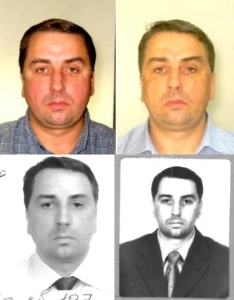Former South Ossetian Defence Minister identified as the Russian general in charge of the attack on MH17
A joint international open source investigation led by Bellingcat has identified conclusively that the person of interest known as ‘Andrey Ivanovich’ or ‘Orion’ whose identity is sought by the Joint Investigating Team in connection with the criminal investigation into the downing of MH17, is in fact Russian citizen Oleg Vladimirovich Ivannikov, born on 2 April 1967.
Bellingcat has determined with very high certainty that at the time of the downing of MH17, Oleg Ivannikov was an officer of the Main Directorate of the General Staff of the Russian Ministry of Defence (GRU), and served in that function until at least as late as September 2017.
Bellingcat has also established with very high certainty that Oleg Ivannikov, using the alias ‘Andrey Ivanovich Laptev’ in a covert operation for the Russian intelligence services, served as chairman of the Security Council (2004-2006), and as Minister of Defense and Emergencies (2006-2008) of the self-proclaimed Republic of South Ossetia.

The Bellingcat-led investigating team used primarily open source data sources to reconstruct a curriculum vitae of Oleg Ivannikov. As detailed in the biographical timeline below, Ivannikov was born in Eastern Germany as son of a decorated Russian major general, before attending a Soviet military academy in Kyiv, and graduating from the Aerospace Faculty of the Moscow Aviation Institute in Moscow in 1990. At an undetermined stage between his graduation and 2003, Ivannikov became a military officer working for GRU.
During his undercover deployment in South Ossetia from 2004 to 2008, Ivannikov provided military guidance to the breakaway region at a time when both Russia and Georgia competed for its closer reintegration. During his term in office, military tensions between South Ossetia and Georgia escalated, with Russian mercenaries joining South Ossetian militias in attacking Georgian peacekeeping forces, and at one point shooting down a Georgian reconnaissance drone.
After stepping down from ministerial position in 2008, Ivannikov pursued a PhD degree in Russia with a thesis titled “The Complex Nature of the Information War in the Caucasus”. From 2012, Ivannikov served – under his real name and credentials as ‘military expert’ – as director of the Russia-Caucasus Research Center of the state-funded International Institute of the Newly Established States. In this capacity he published more than twenty articles, mainly about the war in Syria and the conflict between Georgia and South Ossetia. Simultaneously, he continued to play a limited role in South Ossetian political life via his alter ego, establishing a research institute in South Ossetia, and at one point publicly endorsing a presidential candidate. Ivannikov continued publishing articles as director of the Russia-Caucuses Center until late 2013.
The reporting team has also determined with high certainty that Oleg Ivannikov was the person behind the covert name ‘Andrey Ivanovich’ who, according to multiple reports by Russian militant commanders and separatists fighting in the so-called ‘Luhansk People’s Republic’ (‘LNR’), was military adviser and de facto handler of the political leadership of the LNR in 2014. Ivannikov was deployed to Ukraine at an undetermined point in the first half of 2014, and remained there at least until early 2015. During his undercover deployment to LNR, he coordinated and supervised the military activities of Russian militants, pro-Russian separatists and “private army” contingents from the Wagner group. Ivannikov also supervised the procurement and transport of weapons across the Russia Ukraine border. He held these functions at the time of the downing of MH17.
The findings in this report for the first time establish the direct or indirect involvement of a high-ranking Russian military officer on active duty operating on the territory of Ukraine in the destruction of the airliner.



















